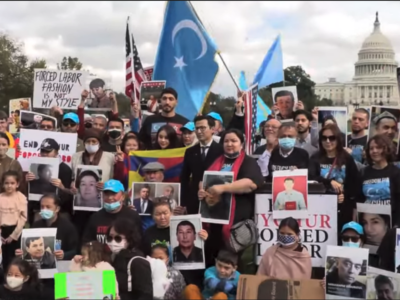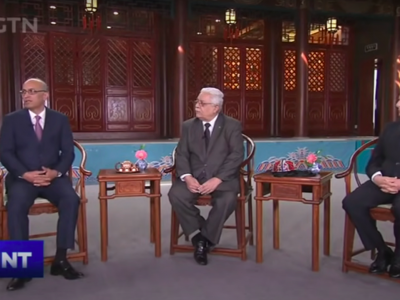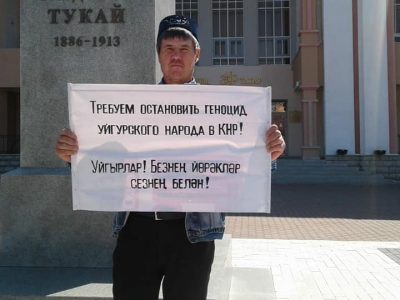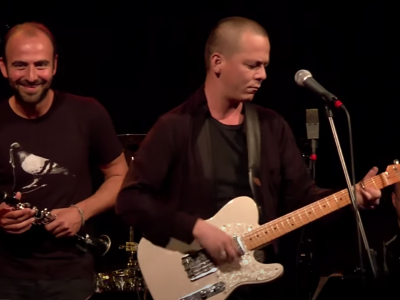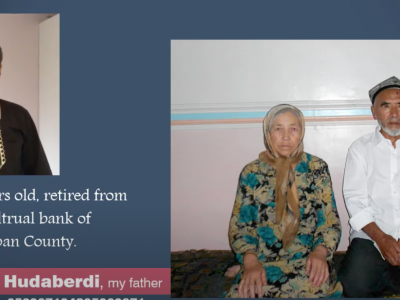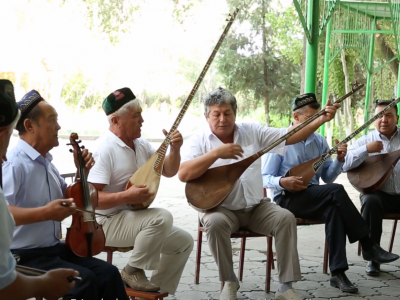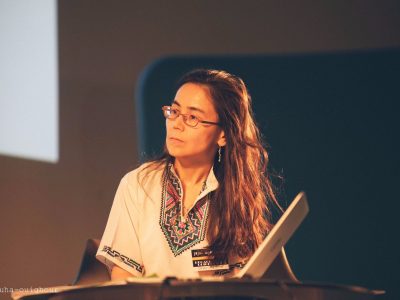
Screenshot from VOX YouTube channel (04:47) detailing Beijing’s oppression of Uyghurs in Xinjiang.
Despite Beijing’s efforts to constantly deny its genocide against the Uyghur people, and to silence any voices, domestically and abroad, who dare to remind the world of the plight of the 12 million people plus community members — the Uyghur Region, known as the Xinjiang Uyghur Autonomous Region, based on its Chinese name, never fails to remind Beijing it can never be silenced.
The unprecedented street protests occurred across China from late November to mid-December 2022 and forced Chinese President Xi Jinping to abandon his controversial “zero-COVID” policy. The protests started on November 25 in Xinjiang’s capital Ürümqi after a fire broke out in an apartment complex, resulting in ten deaths. The building was under strict lockdown because of China’s zero-COVID policies, which may have led to increased deaths as residents were unable to exit through the buildings’ primary entrance.
One of the biggest demonstrations that shook Shanghai, a city known for its business mind and political conservatism, took place for several days on Ürümqi street as social media censorship prohibited any mention of the fire in Xinjiang’s capital. At one point, the authorities decided to remove signs identifying the street, but it was too late: for millions of Chinese people, grief over deaths in Ürümqi had turned into anger against their government.
In recent Chinese history, this is not the first time that there is an Uyghur element in political demands: one of the top leaders of the student movement that was crushed on June 4, 1989, in Tiananmen Square, is Örkesh Dölet, more known internationally under the Chinese transcription of his name, Wu’erkaixi.
Regardless of what Beijing and its allies claim, genocide is taking place in the Uyghur region, a fact recognized by a growing number of members of the international community. Indeed since 2017, China's government has ramped up its systematic targeting of minority citizens living in Xinjiang, portraying them as “motherland separatists“ or simply “terrorists.” People in the region have been deprived of their most basic human rights, including freedom of religion, movement, and the right to communicate in their native language.
State-led persecution has taken different forms: imprisonment — often with heavy sentences of over 10 years — and incarceration in internment camps, which, according to expert sources, may have at some point contained over a million mostly Muslim minorities.
Given the secrecy of the internment camps, which China insists on presenting as “vocational training centers,” and the lack of information coming from the country's jails, it is impossible to say how many people have died in incarceration, often without knowing what they were accused of. Press reports suggest the figure could be hundreds or possibly thousands. For the relatives of detainees, located both inside and outside China, the pain of knowing nothing about the well-being of their loved ones is relentless and does not lessen as the months and years go past.
Certain foreign countries hosting Uyghur refugees have often decided to bow to China and forcefully repatriate Uyghur people who have simply demonstrated and testified of what happened to them or their family members in China.
For an overall picture of the 2018–2020 period, check Global Voices’ special coverage below:
For more information, the following sites and resources offer in-depth data, analysis, and news about the situation of Uyghurs worldwide, but also about their rich cultural heritage:
- Shahit is an invaluable database of several thousand documented cases of Uyghurs and members of other groups living in Xinjiang who have been directly targeted because of their ethnicity.
- The World Uyghur Congress, who refers to the Uyghur region as East Turkestan as many Uyghurs do, is an international organization based in Germany that “represents the collective interest of the Uyghur people both in East Turkistan and abroad.
- The China Project – Xinjiang offers regular updates on the situation of Uyghurs across the world.
- The Uyghur Meshrep Project offers insights into Uyghur music and traditions.
Today, as the situation remains largely unchanged for Uyghurs inside and outside of China, Global Voices continues its coverage with local and global stories on this large-scale violation of human rights:
Stories about Celebrating Uyghur resilience
Repression of Uyghurs remains unchanged: Interview with Xinjiang Victims Database founder Gene Bunin
Gene Bunin, founder of the Xinjiang Victims Database talks to Global Voices about the lack of political will to highlight internationally the oppression of Uyghur people in China.
Istanbul's Uyghur community protest outside the Chinese Consulate despite the cost of reprisals
Today's demonstration comes at a great risk amid fears of retribution for the members of the Uyghur community living in Turkey.
A Uyghur journalist's demand: Bring an end to my family’s decades of suffering
"I urge UN staff to help get information on whether my 11 relatives are alive and, if so, where are they and why and how they were punished?"
Why Uyghurs are envious of Ukrainians
What Uyghurs would like to say to Ukrainians: "Don’t abandon arms, otherwise you’ll all be facing death, like us."
When athletes get political: Support for the Uyghurs ahead of the Beijing Winter Olympics
NBA player Enes Kanter called for fellow Muslim athletes to join him in condemning the atrocities that the Uyghurs have been suffering at the hand of the Chinese government.
The Uyghur issue, China’s greatest fear, is looming in Afghanistan
As the Taliban and China seem to strengthen their ties, the tragedy of the Uyghurs imprisoned in China's so-called re-education camps could prove to be a diplomatic stumbling block.
Turkey’s Uyghur dilemma in the context of China’s Belt and Road Initiative
As economic ties between Ankara and Beijing strengthened, Turkey's policies on the treatment of Uyghurs in China weakened.
The Chinese government drives support among ambassadors of Muslim countries for the Uyghur genocide
Ignoring data collected over the years by activists and testimonies by former inmates of Xinjiang "re-education camps," ambassadors from Muslim countries peddled the official Chinese line during a staged interview.
Where are the voices of Central Asian and Russian Uyghurs?
Why are small communities of Uyghurs in Western countries more active in pursuing justice for their counterparts in China than the large populations of this Muslim minority in Central Asia?
Updating Uyghur: The power of online discussions for language preservation
Though spoken by over 10 million people, the Uyghur language is struggling to adapt to modern life and overcome heavy censorship and language elimination in China
‘Don't come back, or you will disappear': Uyghur mother pleads with her daughter abroad
Global Voices interviewed Mehbube Abla, a 38-year-old Uyghur activist living in Austria since 2004. All the members of her family who stayed in Xinjiang are in prison.
China's persecution of Muslim minorities: An Uyghur student living in Turkey shares her story
I came to Turkey legally, on a passport issued by the Chinese authorities. Why did they punish my family?
‘Uyghur pop music humanizes and amplifies their hopes': Interview with musicologist Elise Anderson
"Uyghur pop is a source of both entertainment and rich inner life. Another role it can play is in humanizing and amplifying Uyghur hopes, aspirations, and lives."
Solo protest in the Netherlands for the Uyghur cause: One man takes on the Chinese state
In the Netherlands, the solo protest of an Uyghur exile puts a spotlight on China's actions against Uyghurs and other Muslims in Xinjiang.
The long journey to Uyghur visibility: An interview with French author Sylvie Lasserre
The issue of China's treatment of the Uyghurs is slowly getting noticed in France, according to the author of the first book in French about Uyghur identity.
‘Where is my family?': A question left unanswered for too many Uyghurs living abroad
After years of silence about the fate of his family, an Uyghur refugee decides to go public about the persecution of Uyghurs in China, despite the trauma he experiences.
The Uyghur Meshrep: A traditional community gathering censored in China
While Uyghurs have for centuries celebrated male bonding and cultural transmission in a ritual of music and conversations, China is now banning the original concept of the tradition.
Uyghur emojis help spread message of cultural resistance over social media
Emojis representing Uyghur characters and culture are now available on the encrypted messenger platform Telegram in an effort by the Uyghur diaspora in Russian-speaking countries to raise visibility.
History repeats itself: Chinese state terror and the dismantling of Uyghur neo-Jadidism
One of the many casualties of the Chinese state's assault on Uyghurs is the climate of progressive and education and culture fostered and funded by Uyghur entrepreneurs.
Uyghur human rights advocate Dilnur Reyhan laments lack of Muslim solidarity
Hatred against the West has blinded ordinary Muslim citizens to the point of refusing to believe news brought by the Western media, even when it concerns concentration camps for Muslims







